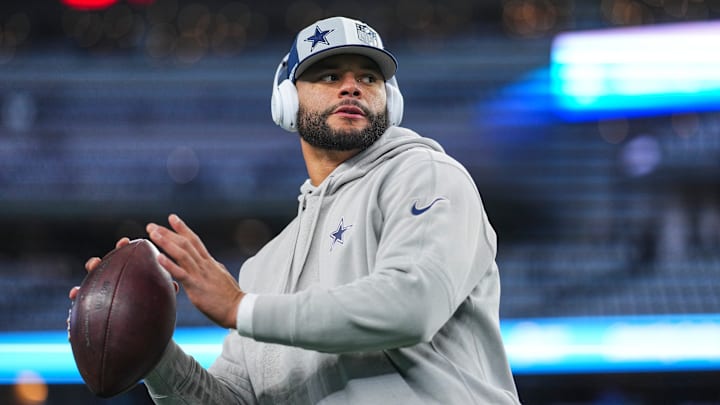Dallas Cowboys owner Jerry Jones isn't afraid of losing quarterback Dak Prescott in free agency, and Prescott isn't afraid of being somewhere other than Dallas in the years to come. For the second time in Prescott's eight-year NFL career, the 30-year-old quarterback is up for a contract extension with his longtime team.
And for the second time in his career, the Cowboys have bungled negotiations by delaying the finalization of a deal with Prescott. The Cowboys have lost money and goodwill through their negotiation strategy with Prescott over the years, but how much they've lost hasn't been tabulated until now.
Dallas Cowboys could have saved millions by giving Dak Prescott fairer deals earlier
CBS' Joel Corry detailed how the Cowboys could have avoided contract fiascos over the years by being proactive. The Cowboys recognized Prescott's talent but didn't want to pay market value for a premium quarterback during the quarterback's rookie deal, so the team delayed his current four-year, $160 million deal for as long as possible. Corry imagines an alternate future where the Cowboys extended Prescott on a four-year deal in 2019 instead of 2021.
If the Cowboys had signed Prescott to a four-year extension two years earlier, the team would have missed out on paying Prescott's $2.1 million rookie salary in 2019. But the team would have then been able to spend their 2020 franchise tag on another player instead of shelling out $31.4 million for Prescott.
Corry theorizes that in 2019, Prescott would have been negotiating alongside edge rusher Demarcus Lawrence, who took up the franchise tag that offseason. To get a deal done, Prescott likely would have wanted to become the second-highest-paid player in the NFL, and he would have needed a contract that edged past the top three highest-paid quarterbacks at the time: Aaron Rodgers, Matt Ryan, and Kirk Cousins.
That would have meant a four-year deal worth $124 million, which is $36 million less than the deal Prescott eventually signed in 2021. Plus, the Cowboys got $9.5 million in cap relief when signing Lawrence in 2019, which could have been useful for such a deal. It's worth noting that such a deal would have had to come at the perfect time: Russell Wilson soon reset the quarterback market with a four-year deal worth up to $146 million.
Corry's scenario means that Prescott would have come up on his second contract extention in 2023 rather than 2024. After quarterbacks like Wilson, Rodgers, and Deshaun Watson repeatedly reset the quarterback market in the preceding years, Prescott could have expected a five-year deal worth $250 million with $175 million guaranteed. Last year, Prescott was coming off a disappointing 2022 performance that would have given the Cowboys additional leverage in negotiations.
Of course, the team would have also had to sign him before Jalen Hurts and Lamar Jackson signed their own five-year deals worth $255 million and $260 million respectively.
As Corry details, the Cowboys could have saved millions in the long run by signing Prescott at market value in the earliest possible iteration of contract negotiations. Instead, the Cowboys have held fast to their longtime quarterback while constantly undermining his value to the franchise.
